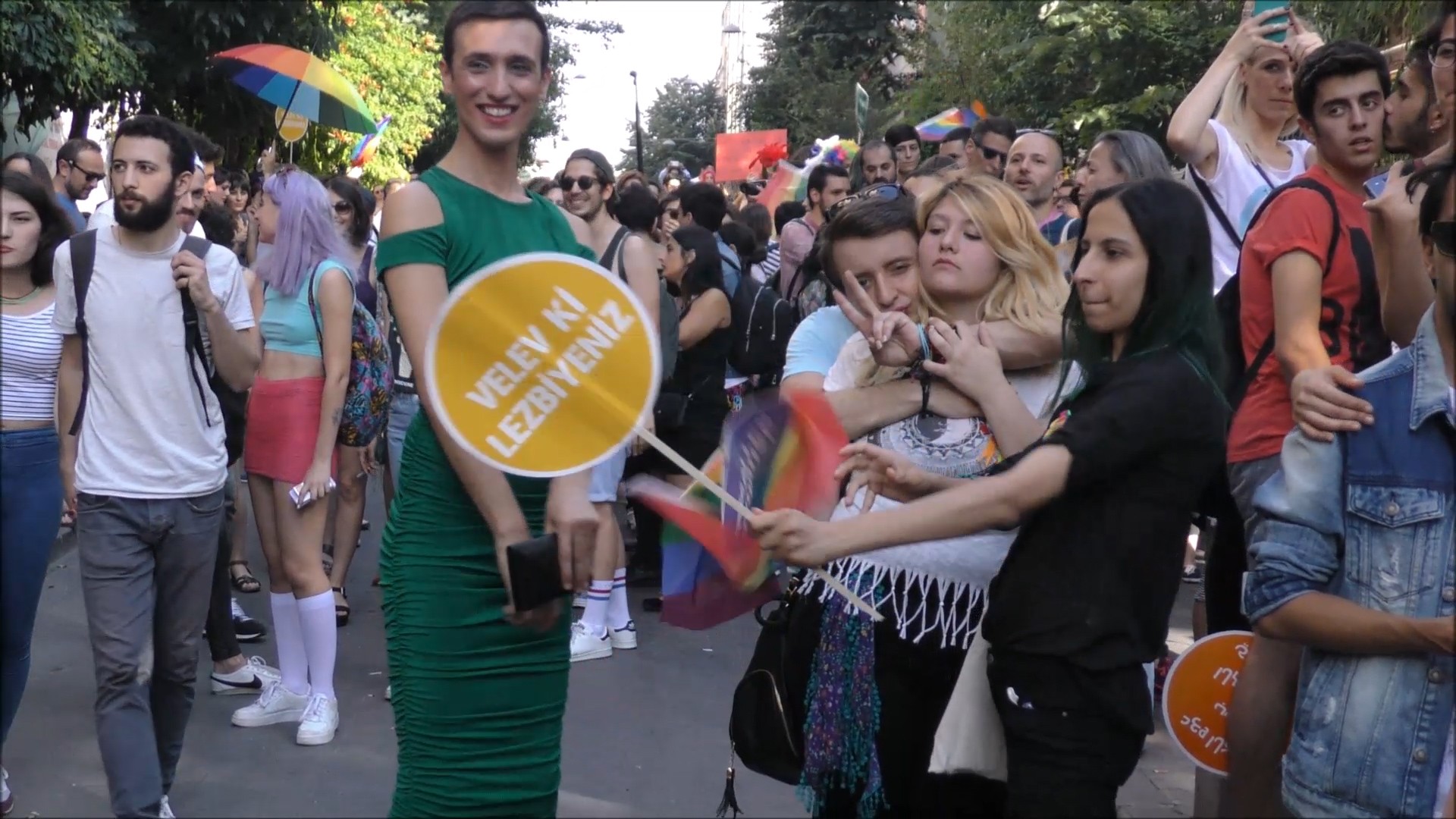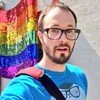Protestors block the route of this summer's Twin Cities Pride Parade. Photo by Glen Stubbe/Star Tribune via AP
Dot Belstler had a feeling there'd be conflict at this year's pride parade. As executive director of Minnesota's Twin Cities Pride, she'd been keeping a close eye on simmering tensions between police and community activists nationwide. Those tensions had grown to a rolling boil a few days before the 2017 Twin Cities Pride Festival, with the acquittal of police officer Jeronimo Yanez, who had shot and killed Philando Castile, a local school worker.The previous year, Twin Cities Pride had heightened the festival's police presence in response to the Pulse nightclub shooting, a tragedy that struck just two weeks prior. "Over the winter we had some listening sessions with people of color and trans folks, who let us know in no uncertain terms that the increased police presence was threatening," Belstler told me. "That's concerning for us. We want pride to be safe for everybody. So we backed way off on how we wanted to present the police in the parade."In other cities, 2017 pride parades had already been met with disruption, protest, and conflict. And sure enough, halfway down the Twin Cities parade route, a group of protesters surged from the sidelines with signs reading "Make Pride Revolutionary Again" and "Justice for Philando." With the parade now blocked, it was up to Belstler to respond, and she said she raced to the scene to position herself between the chanting protestors and the rest of the marchers. But her goal wasn't to stop the protests—instead, she said, she was there "to be a buffer, to make sure they were allowed to be there.""Pride started as a protest," she said.After some speeches, a die-in, and a moment of silence, the protesters allowed the parade to continue, albeit with a very different tone. The action highlighted just how politically fraught many pride celebrations have become, and how 2017 may have represented a sea change in the trajectory of the pride movement in general.As pride events grow ever more corporate—such as Pittsburgh Pride, which sold its name to a Republican-supporting fracking company this year—backlash is growing from the LGBTQ community. And increasingly, that response is taking the form of unofficial guerrilla pride events, meant to counter what many see as prides that have grown tone-deaf, lacking in diversity and divorced from their original spirit.Often led by marginalized groups, these independent protests, parties, and marches have experienced exponential growth in the past few years, and echo the scrappy DIY nature of the LGBTQ protests of the 1970s.This summer, the Washington, DC–based No Justice No Pride, a group seeking to protest the corporatization of pride and center queer people of color in celebrations, saw widespread media coverage when they formed a human chain to block participants from Lockheed Martin at Capital Pride. "For a long time, the priority was gay marriage and fighting in the military, and all these things that kept the more affluent white LGBT people from accessing their privilege as white people," said Drew Ambrogi, a steering committee member of the group. "We're at a turning point now where the community can say 'we got what we want,' or they can say 'we need to fight for all LGBT people.'"It's not only in America that communities are demanding more focus on groups that were previously ignored. In South Africa, amid complaints that Johannesburg Pride is a "celebration of whiteness and freedom" and that Cape Town Pride lacks inclusivity, focus has shifted over the past several years toward bringing pride to townships like Kanana and Khayelitsha, where queer people face discrimination more acutely.At this summer's Amsterdam Pride, a protest march kicked off this year's festivities for the first time, where organizers said 7,000 participants joined together to call attention to the more than 76 countries where homosexuality is still a crime. This year also marked a broader symbolic change for the annual celebration: a name change from Gay Pride to Pride Amsterdam, to better acknowledge the full spectrum of the LGBTQ community.Community-based protests yielded significant change this year in Tel Aviv. Pride events there are produced by the government, which announced early in the year that they would spend 11 million shekels (about $3 million US dollars) promoting gay tourism. "We were so mad," said Chen Arieli, chairperson of a nonprofit called the Aguda that coordinates LGBTQ organizations. "The budget that we get from the government, [for] all eighteen organizations, is 2 million shekels."In response, Arieli said The Aguda called to cancel the parade. "We said the parade is ours," Arieli said. "It's absurd that the government is using the LGBT community to promote tourism to Israel on one hand, and on the other hand doesn't support our actions on the ground."With no queer groups marching, Arieli said the government panicked and convened a meeting with his group, agreeing to shift millions of shekels in government spending into the community.
Watch VICE News report on state interference with Istanbul Pride:
That jostling for resources can often be a source of bitter division within the queer community. "At some point you have those marginalized groups who say, 'We want to have our spot,'" said van Dalen at InterPride, an organization that helps organize prides worldwide."And the only way you can do that is by giving up space."In Washington, DC, for example, the tug-of-war over the focus of Capital Pride only grew more contentious after this year's No Justice No Pride protest."In light of progress with marriage equality and Don't Ask Don't Tell, it's been important for our communities to ensure that we do not become complacent," said Ryan Bos, executive director of Capital Pride in Washington, DC—a statement that No Justice No Pride would presumably agree with.But when it comes to making that a reality, community organizers and Capital Pride see things very differently. For the past few years, activists have been pushing Capital Pride to separate itself from sponsors like Wells Fargo, which helps finance private prisons and the Dakota Access pipeline, and engaged in discriminatory lending. "It feels as though they have no standard at all in terms of who they're giving access to our community," Ambrogi said, pointing out that his organization held a Queer and Trans Night of Healing and Resistance as an alternative to Capital Pride this year."There are a lot of folks emerging now, a lot are younger, black, brown, and trans, and they think this complacency is unacceptable," he said. "If the groups like HRC and Capital Pride are not willing to relinquish control and turn over our movement to a new generation of people with different ideas, then we're going to seize that control through our own means."But not every conversation on the future of pride is so adversarial. Twin Cities Pride is holding listening sessions to gather feedback; Belstler said they also hired consultants from within marginalized communities."We're not the bad guys," said Belstler. "We really do want people's input. We've always thought that people should come to us with questions and concerns, and now we're realizing we need to go to the community."Follow Matt Baume on Twitter.
Advertisement
Advertisement
Advertisement
Watch VICE News report on state interference with Istanbul Pride:
Advertisement

That jostling for resources can often be a source of bitter division within the queer community. "At some point you have those marginalized groups who say, 'We want to have our spot,'" said van Dalen at InterPride, an organization that helps organize prides worldwide."And the only way you can do that is by giving up space."In Washington, DC, for example, the tug-of-war over the focus of Capital Pride only grew more contentious after this year's No Justice No Pride protest."In light of progress with marriage equality and Don't Ask Don't Tell, it's been important for our communities to ensure that we do not become complacent," said Ryan Bos, executive director of Capital Pride in Washington, DC—a statement that No Justice No Pride would presumably agree with.But when it comes to making that a reality, community organizers and Capital Pride see things very differently. For the past few years, activists have been pushing Capital Pride to separate itself from sponsors like Wells Fargo, which helps finance private prisons and the Dakota Access pipeline, and engaged in discriminatory lending. "It feels as though they have no standard at all in terms of who they're giving access to our community," Ambrogi said, pointing out that his organization held a Queer and Trans Night of Healing and Resistance as an alternative to Capital Pride this year."There are a lot of folks emerging now, a lot are younger, black, brown, and trans, and they think this complacency is unacceptable," he said. "If the groups like HRC and Capital Pride are not willing to relinquish control and turn over our movement to a new generation of people with different ideas, then we're going to seize that control through our own means."But not every conversation on the future of pride is so adversarial. Twin Cities Pride is holding listening sessions to gather feedback; Belstler said they also hired consultants from within marginalized communities."We're not the bad guys," said Belstler. "We really do want people's input. We've always thought that people should come to us with questions and concerns, and now we're realizing we need to go to the community."Follow Matt Baume on Twitter.
